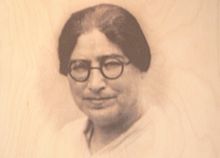Hana Meisel
Hana Meisel | |
|---|---|
חנה מייזל | |
 | |
| Born | December 25, 1883 |
| Died | 1972 (aged 88–89) Nahalal, Israel |
| Political party | Poale Zion |
Hana Meisel (Hebrew: חנה מייזל, born 25 December 1883, died 1972) was a Jewish agronomist, feminist and Zionist.
Life[edit]

Meisel was born in Grodno in the Russian Empire (today Hrodna in Belarus),[1] and immigrated to Palestine in 1909, during the Second Aliyah, where she became a noted agronomist. Meisel was a founder of Havat HaAlamot (Hebrew: חוות העלמות, "the maidens' farm") agricultural school at Kinneret Farm in 1911 (closed in 1917), and of the agricultural school for girls at Nahalal (opened in 1929). She studied agriculture and natural science in Odessa, Switzerland and France.
Meisel made considerable contributions to the feminist wing of the Zionist movement. She was a member of Poale Zion and was elected to the Assembly of Representatives.
She was married to Eliezer Shohat, also a well-known figure in the Zionist movement, much like his brother Israel Shochat.
Hana Meisel died at Nahalal in 1972.
In literature[edit]
Meisel is referenced in Shmuel Yosef Agnon's fictionalized travelogue of the Second Aliyah HaGalilah (in English as "To the Galilee"[2]), published in his posthumous volume Pithei Devarim.
References[edit]
- ^ Joan Comay, Lavinia Cohn-Sherbok, "Who's who in Jewish History" Routledge, 2002, ISBN 0-415-26030-2, page 145
- ^ "To the Galilee". Tablet Magazine. Retrieved 6 May 2015.
External links[edit]
- Esther Carmel-Hakim. "Hannah Maisel-Shohat". Jewish Women: A Comprehensive Historical Encyclopedia. 1 March 2009. Jewish Women's Archive. (Viewed on January 9, 2016) [1]
- Reinharz, Shulamit. "Timeline of Men and Women's Issues in the Yishuv and Israel" (PDF). Archived from the original (PDF) on June 15, 2011.
- 1890 births
- 1972 deaths
- People from Grodno
- Belarusian Jews
- Jews from Ottoman Palestine
- Jews from Mandatory Palestine
- Israeli people of Belarusian-Jewish descent
- Jewish scientists
- Israeli feminists
- Israeli educators
- Israeli women educators
- Israeli Jews
- Jewish feminists
- Members of the Assembly of Representatives (Mandatory Palestine)
- 20th-century Israeli women politicians
- Women agronomists
- 20th-century women scientists
- Zionists
- Jewish women scientists
- 20th-century agronomists
- Agriculture stubs
